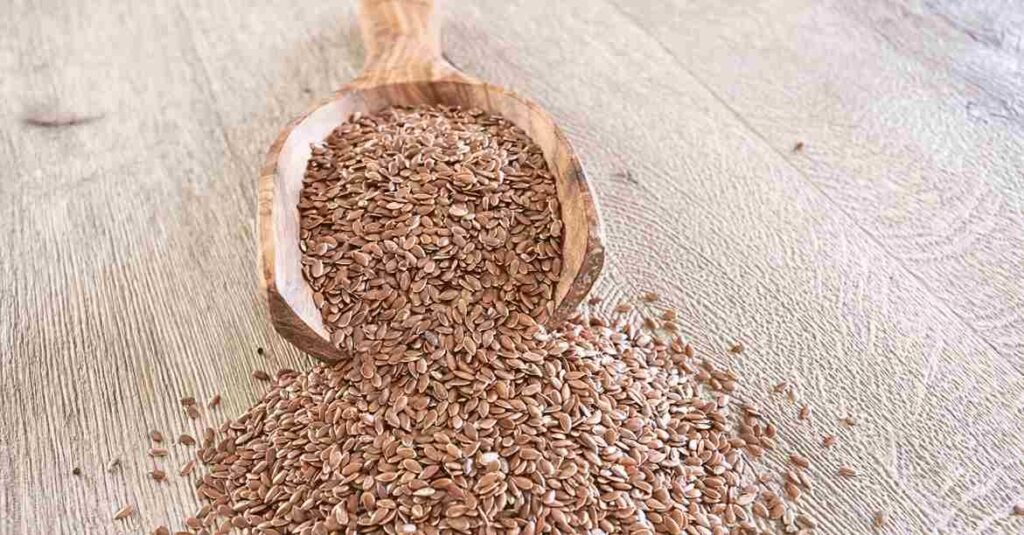
10 Key Advantages of Flaxseed and Ways to Incorporate Alsi into Your Diet

What is Flaxseed?
Flaxseed, also known as linseed, is the seed of the flax plant (Linum usitatissimum). It’s a tiny, golden or brown seed that’s rich in nutrients, particularly omega-3 fatty acids, lignans, and fiber. Flaxseed can be consumed in various forms, including whole seeds, ground seeds (flaxseed meal), and oil. It’s often added to foods like smoothies, yogurt, cereal, and baked goods for its nutritional benefits. Flaxseed is a renowned superfood for its potential health benefits, such as reducing inflammation, improving heart health, and promoting digestive regularity.
Benefits and Linseed and Flaxseed
Linseed and flaxseed are actually the same thing, derived from the flax plant (Linum usitatissimum). So, the benefits of linseed and flaxseed are essentially identical. Here are some of the key benefits:
1. High in Omega-3 Fatty Acids
Both linseed and flaxseed are rich sources of alpha-linolenic acid (ALA), a type of omega-3 fatty acid that is essential for heart health, brain function, and reducing inflammation in the body.
2. Rich in Fiber
Linseed and flaxseed are excellent sources of dietary fiber, including both soluble and insoluble fiber. This fiber content promotes digestive regularity, helps to regulate blood sugar levels, and supports heart health.
3. Cardiovascular Health
The omega-3 fatty acids and fiber in linseed/flaxseed may help to lower blood pressure, reduce LDL cholesterol levels, and decrease the risk of heart disease.
4 . Weight Management
The combination of fiber and healthy fats in linseed/flaxseed can help promote satiety, potentially reducing overall calorie intake and supporting weight management efforts.
5. Digestive Health
The fiber content in linseed/flaxseed supports digestive regularity and a healthy gut microbiome, which is important for overall digestive health and immune function.
6. Improved Skin and Hair Health
The omega-3 fatty acids in linseed/flaxseed help to nourish the skin and hair from within, promoting moisture retention and reducing inflammation. Including flaxseeds in your diet may contribute to healthier-looking skin and stronger, shinier hair.
7. Source of Lignans
Linseed and flaxseed contain lignans, which are phytochemicals with antioxidant properties. Lignans may help to reduce the risk of certain cancers, such as breast and prostate cancer, and also support hormonal balance.
8. Gluten-Free and Versatile
Linseed/flaxseed is naturally gluten-free and can be easily incorporated into a variety of dishes, including smoothies, yogurt, oatmeal, salads, and baked goods.
9. Bone Health
Flaxseeds contain minerals like calcium, magnesium, and phosphorus, which are essential for maintaining bone health. Consuming flaxseeds regularly may contribute to stronger bones and reduce the risk of osteoporosis.
10. Blood Sugar Control
The soluble fiber content in linseed/flaxseed helps to slow down the absorption of sugar in the bloodstream, which can aid in blood sugar control. This is particularly beneficial for individuals with diabetes or those at risk of developing diabetes.
Types of Flaxseed Products
Flaxseed products come in various forms, each offering unique benefits and ways to incorporate them into your diet. Here are some common types of flaxseed products:
1. Whole Flaxseeds: These are the whole seeds of the flax plant. They have a hard outer shell that protects the nutrients inside. Whole flaxseeds can be stored for longer periods and are suitable for grinding at home using a coffee grinder or blender. They can be added to recipes as a crunchy topping or ingredient.
2. Ground Flaxseeds (Flaxseed Meal): Ground flaxseeds are whole flaxseeds that have been finely ground into a powder-like consistency. Grinding flaxseeds makes their nutrients more accessible to the body, as the outer shell is broken down. Ground flaxseeds can be easily incorporated into smoothies, baked goods, oatmeal, yogurt, and other dishes.
3. Flaxseed Oil: Flaxseed oil is extracted from flaxseeds and is rich in omega-3 fatty acids, particularly alpha-linolenic acid (ALA). Flaxseed oil is typically used as a dietary supplement or as an ingredient in salad dressings, sauces, and dips. It should not be used for cooking at high temperatures, as heat can damage its delicate fatty acids.
4. Flaxseed Meal: Flaxseed meal is similar to ground flaxseeds but may have a coarser texture. It is often used as a gluten-free flour substitute in baking recipes, especially for those looking to increase their fiber and omega-3 intake. Flaxseed meal can also be added to smoothies, yogurt, and oatmeal.
5. Flaxseed Gel: Flaxseed gel is made by soaking whole flaxseeds in water to create a thick, gel-like substance. This gel can be used as a vegan egg substitute in baking recipes or as a thickening agent in soups, sauces, and smoothies. Flaxseed gel is particularly useful for individuals looking for plant-based alternatives in cooking and baking.
6. Flaxseed Supplements: Flaxseed supplements are available in the form of capsules, softgels, or powders. These supplements provide a concentrated source of flaxseed nutrients, particularly omega-3 fatty acids and lignans. They are convenient for individuals who may not consume enough flaxseeds in their diet but want to reap their health benefits.
When choosing flaxseed products, it’s essential to consider factors such as freshness, storage conditions, and how the product will be used in recipes. Incorporating a variety of flaxseed products into your diet can help you enjoy the diverse health benefits of this nutritious seed.
How Can You Eat Flaxseed
There are several ways to incorporate flax seeds into your diet. Here are some easy and delicious methods:
1. Ground Flax Seeds: Grinding flax seeds makes their nutrients more accessible to your body. You can purchase ground flaxseed (flaxseed meal) or grind whole flax seeds yourself using a coffee grinder or blender. Add ground flax seeds to:
- Smoothies: Blend them with fruits, vegetables, yogurt, and your choice of liquid for a nutritious boost.
- Oatmeal or Cereal: Stir ground flax seeds into cooked oatmeal or sprinkle them over your favorite breakfast cereal.
- Baked Goods: Mix ground flax seeds into pancake batter, muffin batter, bread dough, or homemade granola for added fiber and nutrients.
2. Whole Flax Seeds: Whole flax seeds can also be added to foods for a crunchy texture and nutty flavor. Here are some ideas:
- Yogurt or Cottage Cheese: Sprinkle whole flax seeds over yogurt or cottage cheese for a nutritious topping.
- Salad: Add whole flax seeds to salads for extra crunch and a nutritional boost.
- Trail Mix: Mix whole flax seeds with nuts, dried fruits, and seeds to create a healthy and portable snack.
3. Flaxseed Oil: Flaxseed oil is another option that provides the benefits of flax seeds in liquid form. However, keep in mind that flaxseed oil does not contain fiber or lignans like whole or ground flax seeds. You can use flaxseed oil to:
- Make Salad Dressings: Mix flaxseed oil with vinegar, lemon juice, herbs, and spices to create a homemade salad dressing.
- Drizzle Over Food: Use flaxseed oil as a finishing oil for cooked vegetables, grains, or roasted potatoes.
- Blend Into Smoothies: Add a tablespoon of flaxseed oil to your smoothie
4. Flaxseed Gel: You can make a gel-like substance by soaking flax seeds in water, which can be used as a vegan egg substitute in baking recipes or as a thickening agent in soups, sauces, and smoothies. To make flaxseed gel:
- Mix 1 tablespoon of whole flax seeds with 3 tablespoons of water in a small bowl.
- Let the mixture sit for about 10-15 minutes until it thickens into a gel-like consistency.
- Use the flaxseed gel as needed in your recipes.
When consuming flax seeds, it’s essential to drink plenty of water to help prevent any potential digestive issues, especially if you’re increasing your fiber intake. Start with small amounts and gradually increase as your body adjusts.
Flaxseeds are a powerhouse of nutrition, offering a wide array of essential nutrients. They are particularly rich in omega-3 fatty acids, with a single tablespoon of ground flaxseeds providing approximately 1.8 grams of alpha-linolenic acid (ALA), an essential fatty acid important for heart health and brain function. Flaxseeds are also an excellent source of dietary fiber, both soluble and insoluble, which promotes digestive regularity, helps control blood sugar levels, and supports heart health. Additionally, flaxseeds contain lignans, plant compounds with antioxidant properties that may help reduce the risk of certain cancers and support hormonal balance. They are a good source of minerals such as magnesium, phosphorus, and copper, as well as vitamins B1 and B6. Flaxseeds are low in carbohydrates and contain no cholesterol, making them a valuable addition to a balanced diet.
Frequently Asked questions
Common stress management techniques include relaxation exercises (such as deep breathing and meditation), physical activity, time management skills, seeking social support, maintaining a healthy lifestyle, and practicing mindfulness.
- Strategies for reducing workplace stress include setting boundaries, prioritizing tasks, practicing time management, taking regular breaks, seeking support from colleagues or supervisors, and engaging in stress-relief activities outside of work.
- Stress management involves adopting techniques and strategies to cope with and reduce the impact of stress on physical, emotional, and mental well-being. This may include relaxation techniques, physical activity, time management skills, seeking social support, and maintaining a healthy lifestyle.
Related Articles

Darshika Raj
Blogger
I’m Darshika, final year student from business background and currently working in MNC. I’m passionate about reading, writing and exploring different topics.


